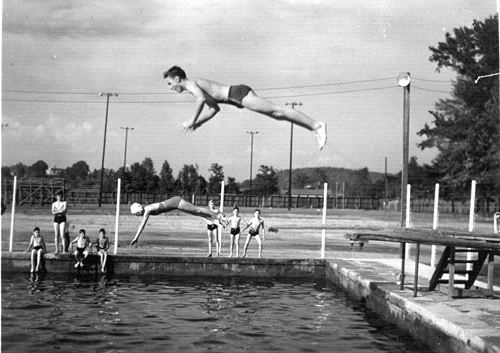Jessie Corona de Montoya moved with her family to Fullerton in 1921. Her father, Jose Ramon de Montoya, was a rancher in Riverside, and then a foreman for a rock and gravel company. They lived on Raymond Ave. in Fullerton. The ancestry of the Montoyas was a mixture of French, German, Mexican, and Native American. Thus, although the family was originally from Mexico, some of the members had blonde hair and blue eyes, and some were darker-skinned. This variety of complexions and mixed ancestry led to a lot of confusion and conflict in the 1920s in Fullerton, where discrimination against Mexicans was fairly widespread.
Montoya recalls an experience where she and her siblings went to the public pool in Fullerton. To enter the public pool, they had to go though a turnstile. Her youngest brother, Edward Lorraine, had blonde hair and blue eyes, and he was allowed in. Her sister, who had light brown hair and an olive complexion, was allowed in. When one of her darker-skinned brothers tried to get in, the man at the turnstile said, “You can’t come in, we have a day for Mexicans to swim.”
This made her older sister, Esther, really mad. Montoya recalls, “She grabbed the man and she pulled him over right close to her face and she said, ‘He is my brother. His skin is darker than mine. How come you let the blonde one in? They’re from the same father and mother.” Esther, in a rage, “hit him one time, she grabbed him...by the hair. She grabbed him by the neck and she punched that man until somebody called the police.”
When the police came, Esther held her ground.
“What’s this all about?” the police asked.
“He wouldn’t let us in for swimming. We paid our way; we had money. He let those two in and then when this brother was ready to go in, he wouldn’t’ let him it. So when he said there was a certain day for Mexicans to swim that made me awfully mad because we are Americans, and I never knew we were anything else but Americans.”
The police man looked at the beat-up turnstile man.
“Did you do this to him?” the officer asked Esther.
“Yes,” she said, “and I’ll do it again.”
“You let them go on in and swim,” the officer said.
“I wouldn’t go in there if he paid me,” she said, and took her siblings home.
Montoya recalls another incident where her family was at the movies in Anaheim and a couple teenagers called her father a “Kraut” because he had blonde hair and blue eyes. This was during WWI, and her brother was actually overseas fighting the Germans.
“That made us very angry,” she recalls, “We were twelve, and maybe seven and eight...so all three of us in unison jumped over dad and mom, over the next seat where those two young men were, they were teenagers, and beat up on them. We were outlaws, I guess.”
Source: CSUF Oral History Program interview, 1975

